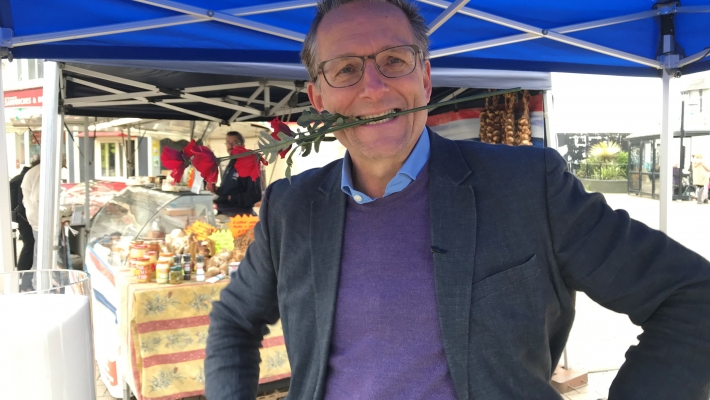
Michael Mosley's disappearance on the island of Symi and the tragic news which followed five days later has prompted a richly deserved deluge of tributes to him as a presenter, journalist, and public health guru. Today we also mourn the passing of an extraordinarily talented science television producer whose work in the BBC Documentaries department from the mid-eighties onwards set a benchmark for history and science filmmaking.
Michael was the nation's favourite health presenter and we were very lucky to work with him just before lockdown in our Horizon film 'Addicted to Painkillers: Britain's Opioid Crisis'. This film, which reached a huge audience, was rooted in his trademark combination of authority, concern and gonzo reportage, putting his own body through the wringer to show rather than tell what was happening inside it - in this case by burning increasingly hot chili paste onto his skin, sizzling it to demonstrate the body's pain receptor system!
Archie Baron, Michael's executive producer for the Opioids documentary, writes:
It was great to get to know Michael properly while making that film. We'd overlapped at the BBC in the nineties but by then Michael was en route to becoming a giant. Over meetings in 2019 at a greasy spoon café in Marylebone (no fry up or croissants for him!) and on the road filming in Hastings, Oxford, and London, I got the chance up-close to witness just how committed he was to television as a medium to encourage evidence-based health change. He was quiet, thoughtful, respectful of the wider team, and focused to work with before coming alive on camera, putting contributors at ease and wielding statistics and complex argument with vim, authority, and mischief.
Michael joined the BBC in 1985 as a trainee producer, giving up a house job as a doctor because he saw how thrilling it might be to engage large audiences. He explained "the joy of both having a medical background and also being from the BBC is that you can talk to almost anyone in the world". In his days as a BBC producer and exec, he communicated complex ideas to millions in programmes ranging from Into the Mind to the pioneering business series Troubleshooter, the archaeological thriller Pompeii: The Last Day to the biographical series Leonardo, The Human Face with John Cleese to The Incredible Human Journey with Alice Roberts.
Being the son of a gastroenterologist, researching gastric secretion and stomach ulcers, the film of Michael's I want to pick as my desert island Michael doc is Ulcer Wars (1994), a Horizon episode which was Michael's first full-length film as producer/director. It focused on Barry Marshall, an Australian physician who became convinced stomach ulcers were caused not by stress or diet but by the bacteria helicobacter pylori. Marshall experimented on himself to prove his thesis, then dismissed by the medical establishment including, as it happens, my father. But Marshall turned out to be right and won the Nobel Prize for his discovery. Meanwhile Michael learnt from Marshall that self-experimentation worked - a discovery which would in time let him share with the world his colonoscopy! Michael was also named medical journalist of the year by the BMA for his film, remarking "I probably did, in a funny way, more good with that one programme than if I had stayed in medicine for 30 years".
Michael had so many more programmes in him. We send Wingspan's condolences to Clare and his children.

